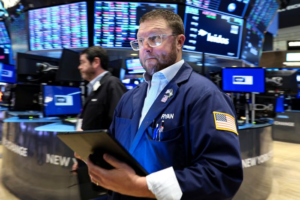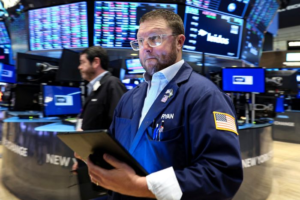

Groups including the antipoverty organization Oxfam have succeeded in placing proposals on shareholder proxy ballots that ask drugmakers to do more to widen access to the Covid-19 vaccines, such as exploring the transfer of their technology to other manufacturers.
The proxy battles are the latest effort seeking to push Covid-19 vaccine makers to share their technology in order to boost supplies at lower-income countries, after some of the countries asked the World Trade Organization to lift patent restrictions and activists urged the U.S. government to share companies’ vaccine technology with other countries.
The efforts haven’t succeeded so far, though the companies say they have stepped up shipments and taken other steps to increase supplies. Shareholder votes on the resolutions will be tallied and announced at annual meetings scheduled for April.

Airport workers unload boxes of Moderna’s vaccine in Nairobi, Kenya, last year.
Photo:
Brian Inganga/Associated Press
“The central problem right now is, by maintaining monopoly control over the technology, the companies are artificially constraining the supply of these lifesaving medicines,”
Robert Silverman,
senior advocacy manager of private-sector development at Oxfam America Inc., said in an interview.
The Covid-19 vaccine makers are asking shareholders to reject the ballot measures, which the companies say could lead to low-quality manufacturing of their shots. The companies say they are making good-faith efforts to boost their shipments, though some executives have said the firms could have done a better job distributing shots to lower-income countries.
J&J, which has sold its vaccine on a not-for-profit basis, said that it either directly delivered, or national governments donated, about 70% of its global vaccine supply to low- and middle-income countries last year, and it has licensed its technology to an African company that will make doses for use in Africa.
SHARE YOUR THOUGHTS
Are Covid-19 vaccine makers doing enough to expand access to their shots in poorer countries? Join the conversation below.
“From the start, Johnson & Johnson has prioritized global equity in the design, development and delivery of our Covid-19 vaccine,” a J&J spokesman said.
Pfizer and Moderna declined to comment on the shareholder proposals beyond the positions stated in their proxy statements. In the statements, the companies said transferring their technology to another manufacturer would be complex and time-consuming.
“Expanding manufacturing to organizations who do not meet Pfizer’s requirements would put patients at risk and pressure on resources,” Pfizer said.
Shareholders may submit proposals on various aspects of a company’s governance, in addition to routine matters that companies put to a vote, like electing directors and ratifying auditors.
A shareholder needs to have owned at least $2,000 worth of shares since January 2020 to be eligible to submit a proposal for annual meetings held before January 2023, when more stringent ownership thresholds are set to fully take effect.
Shareholder-sponsored proposals that are opposed by companies often fail to gain a majority of support among shareholders, while company-backed actions are usually approved.
The proposals are typically nonbinding, but sometimes companies will implement new policies voluntarily in response to majority votes.
The Covid-19 vaccine-access measures could still influence the decisions of executives and boards of directors, however, if the resolutions get sizable minority votes, said
David Maris,
portfolio manager for Phalanx Investment Partners, an investment firm focused on environmental, social and governance investing criteria.
“More and more investors care about public health and equity in public health,” said Mr. Maris, a former drug-stock analyst.

Johnson & Johnson has sold its vaccine on a nonprofit basis. Its shot was given at a hospital in Kabul in July 2021.
Photo:
Paula Bronstein/Getty Images
Global-health advocates have criticized Western vaccine makers’ distribution of shots during the pandemic. A disproportionate share of the vaccine supply so far has gone to wealthy countries including the U.S. and European nations, some of which now have surpluses, while poorer countries in Africa and elsewhere have received fewer doses per capita.
Boston-based Oxfam America owns shares of the major vaccine companies, and placed proposals on the ballots for Pfizer, Moderna and Johnson & Johnson. Oxfam said it owns at least $2,000 worth of shares for each of Pfizer and J&J, and it owns 376 shares of Moderna, which were worth more than $61,000 as of Friday’s closing price. Several social- and religious-oriented investors joined Oxfam in filing the proposals.
Oxfam’s proposals on the Pfizer and Moderna ballots ask the companies to study the feasibility of transferring their intellectual property and technical know-how to other manufacturers that could make doses for low- and middle-income countries.
Pfizer and Moderna asked the Securities and Exchange Commission in December for permission to exclude Oxfam’s resolutions from their proxy ballots because they related to ordinary company business, among other reasons. The SEC denied their requests, saying the matters transcend ordinary business.

Ugandans lined up in Kampala to receive the Pfizer vaccine last month.
Photo:
Hajarah Nalwadda/Associated Press
Pfizer said it expects one billion of its Covid-19 vaccine doses will be allocated to low- and middle-income countries in 2022, out of four billion total doses planned for the year.
Moderna said in its proxy statement there have been instances when it prepared to deliver vaccine doses to low- and middle-income countries, but they were declined by African countries because of distribution logistical challenges on the ground. Moderna said it won’t enforce its patents in more than 90 poorer countries, which could allow manufacturers there to make its vaccine without fear of patent-infringement litigation.
“The shareholder proposal puts forward an unproven solution, lacking in appropriate oversight of our manufacturing processes, which could have negative consequences in terms of safety, quality, efficiency and long-term confidence in mRNA technology,” Moderna said.
Oxfam’s J&J resolution asks the company to report to shareholders whether its receipt of government funding for its Covid-19 vaccine is being, or will be, taken into account when the company sets prices or takes other steps that affect access to its vaccine.
J&J said publishing the report requested by Oxfam could damage the company’s competitive position by revealing its commercial strategy.
Oxfam put the same resolution to J&J shareholders last year, and it received support from about 31% of shares voted at the annual meeting.
The annual meetings for J&J, Pfizer and Moderna are scheduled for April 28.
Write to Peter Loftus at peter.loftus@wsj.com
Copyright ©2022 Dow Jones & Company, Inc. All Rights Reserved. 87990cbe856818d5eddac44c7b1cdeb8
















